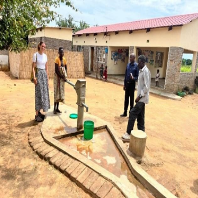tomato jam processing by market women

1.0 Background and Objectives The Africities Food-loss project was implemented in Malawi by the Mzuzu University in collaboration with the Urban Research and Advocacy Center (URAC). The project was funded by the Australian Center for International Agricultural Research (ACIAR) and the International Development Research Centre (IDRC) Canada. Titled, Managing Food Value Chains for Improved Nutrition for Vulnerable Population in Mzuzu City (Malawi), the project aimed to reduce losses in quality and quantities of fresh foods along the urban food value chain. Considering significant losses in quantities incurred during harvest, postharvest, transportation and trading at the open market stages, the project intervened by training women traders to process would-be tomato waste into jam and tomato powder. 2.0 Jam Making Training
A one-day tomato processing training for market women was organized on 16 June 2023. The training was conducted at the premises of one of the key project stakeholders, the Katawa Newlife Vocational Training Centre. Its aim was to empower market women with skills to enable them earn more from their business by processing would-be tomato waste into powder and jam. Tomatoes were identified as a priority crop for processing among fresh foods because it was highly perishable. Findings from the project revealed that tomato losses through damage and spoilage were extremely high which resulted in lower sales and some amounts of the produce being discarded as waste. Tomato damage and spoilage progressively increases from the harvest stage to the market.

Figure 1 is an example of damaged and rotting tomatoes that had already reached the market for sale. Figure 1 is an example of the rotten tomatoes at Mathabwa Market. Figure 1: Rotten tomatoes at Mzuzu Mathabwa Market. Six tomato and leafy vegetable women traders were identified from three local markets in the city of Mzuzu to participate in the training and tomato jam processing trial. The women were identified as potential subsequent trainers of their colleagues. Their training focused on three aspects: food handling hygiene, tomato jam making and tomato drying.

